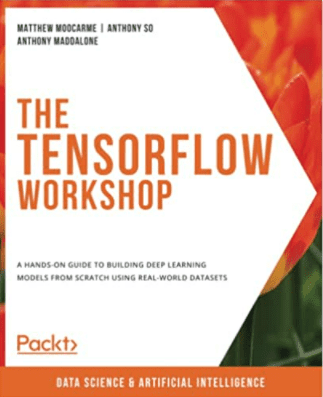Anthony Maddalone is the author of The TensorFlow Workshop. We got the chance to sit down with him and find out more about his experience of writing with Packt.
Q: What is/are your specialist tech area(s)?
Anthony: Deep Learning, Distributed Intelligence, Federated Learning, Edge.
Q: How did you become an author for Packt? Tell us about your journey. What was your motivation for writing this book?
Anthony: I’m a former founder of a successful start-up. I really discovered my love for machine learning and deep learning during that time. I’m currently working as a Research Engineer for a company in Silicon Valley.
I was fortunate to have Packt Publishing reach out to me about writing this book. After some thought, I felt that I needed to share my knowledge and experience with others, in a way that was easily digestible, and helpful. I wanted to make it possible for anyone to feel that they could learn TensorFlow, and not be overwhelmed in the process.
Q: What kind of research did you do, and how long did you spend researching before beginning the book?
Anthony: In the very beginning, I spent a few weeks reading as much as I could about newer trends in the deep learning space. I read several papers and articles and watched Webinars to make sure I was up to date on all things TensorFlow.
Q: Did you face any challenges during the writing process? How did you overcome them?
Anthony: One of the challenges I faced while writing this book, was to make sure everything was explained in an easy to understand way. It was important to me to write a book that anyone could benefit and learn from. So, I needed to make sure that every step, every concept and skill was explained from the high-level idea, down into the low-level code line by line. This was challenging, but also extremely rewarding to write in this way. It provided a new deeper perspective of TensorFlow as an entire platform.
Doing this was really a process of focusing on one small thing at a time. The looking at the writing collectively, and going back an forth until it felt like the right balance between concept and code.
Q. What’s your take on the technologies discussed in the book? Where do you see these technologies heading in the future?
Anthony: While there are over a dozen deep-learning frameworks, there are several reasons that TensorFlow is at the top. TensorFlow remains the most popular because it’s very powerful, easy to use, and has excellent community support. For these reasons, I think TensorFlow will continue to be the go-to deep learning framework for a long time to come.
Q: Why should readers choose this book over others already on the market? How would you differentiate your book from its competition?
Anthony: Unlike most books in the deep learning space, this book is very hands-on. I wanted to write a book that the reader would immediately be able to put the concepts to use and apply the methodologies to real data. I wanted this book to fill the void between high level theory, and low level reference resources, that only focus on the technology and not the applications. I hope the readers will find that this book is very unique and valuable in this way.
Q. What are the key takeaways you want readers to come away from the book with?
Anthony: I hope that any reader can come away from reading this book, and feel as if they actually have some experience working through challenges and tasks similar to what a deep learning practitioner would experience in the work place.
In the exercises throughout the book, the reader is actually given very realistic scenarios to complete to provide that the reader with a sense of actually using TensorFlow to solve real-world problems.
Q. What advice would you give to readers learning tech? Do you have any top tips?
Anthony: One of the biggest challenges people see that are learning about tech is the sheer volume of information. While it’s very tempting to try to learn everything, it’s just not possible. If you’re just beginning, search for things that you find especially interesting, and read further. This can help refine your interests. and then you can take a deep dive into that technology. Whatever you do, don’t let yourself become overwhelmed. Just learn piece by piece.
Probably the best advice of all, is to just get your hands dirty with data. By doing this, you’ll come across all sorts of challenges. There is no better feeling than working through a tough problem, and then finding the solution.
Q. Do you have a blog that readers can follow?
Anthony: I don’t currently, but stay tuned!
Q. Can you share any blogs, websites and forums to help readers gain a holistic view of the tech they are learning?
Anthony: There are a great many resources available to learn about TensorFlow. A few that I find the most helpful are the following:
https://www.tensorflow.org/
https://blog.tensorflow.org/
https://blogs.rstudio.com/tensorflow/
http://adventuresinmachinelearning.com/category/deep-learning/tensorflow/
Q. How would you describe your author journey with Packt? Would you recommend Packt to aspiring authors?
Anthony: It has been an amazing journey for me as an author for Packt! They provide all the resources and support that you need along the way. For anyone out there who is considering authoring a book, I would highly recommend working with Packt on their project.
Q. Do you belong to any tech community groups?
Anthony: Yes, I belong to several, and I would highly recommend anyone learning TensorFlow or any new technology do the same. For me, I’m a part of several groups on LinkedIn. Here are a couple of them:
TensorFlow Enthusiasts
AIAI ( Artificial Intelligence, Deep Learning, Machine Learning) https://aiacceleratorinstitute.com
Q. What are your favorite tech journals? How do you keep yourself up to date on tech?
Anthony: There are many great publications out there. Below are just a few of my favorites.
Wiley International Journal of Intelligent systems https://onlinelibrary.wiley.com/
MIT Technology Review: https://www.technologyreview.com/
Journal of Machine Learning Research https://www.jmlr.org/
IEEE https://www.ieee.org/
Q. How did you organize, plan, and prioritize your work and write the book?
Anthony: This book is focused very much around hands-on work. For each chapter, I identified several of the most critical skills needed to be able to use Tensorflow in a job situation. every chapter has a learning focus, and everything was written was in support of that skill or understanding.
Q. What is that one writing tip that you found most crucial and would like to share with aspiring authors?
Anthony: Some writers are able to schedule writing time, while others work better when they are in a creative mood. I would say to find out what works best for you in the creative process and stick with that. For myself, I found that early mornings worked best. This is a time where I’m not distracted and feel fresh mentally. I also found myself having several ideas throughout the day, when I did my deep work in the morning.
Q. Would you like to share your social handles? If so, please share.
Anthony: www.linkedin.com/in/anthonymaddalone
You can find Anthony’s book on Amazon by following this link: Please click here









